Breen Sullivan, founder of The Fourth Effect, has transformed the landscape of boardroom diversity. Leveraging her decade-long experience as a General Counsel and C-Suite executive in startup and high-growth companies, Breen identified the need for a platform to support under-represented founders, fund managers, and board candidates. The Fourth Effect, powered by AI, connects women with forward-thinking companies seeking diverse perspectives. By focusing on practical pathways to board experience and bridging the gap between board service and investing, The Fourth Effect is reshaping the startup ecosystem. With a network of over 800 companies and 1,700+ board-ready women, Breen’s entrepreneurial journey is driving tangible change. Featured in notable publications like Forbes and Bloomberg Women Buy-Side Network, Breen Sullivan is leading the charge for inclusivity in boardrooms.
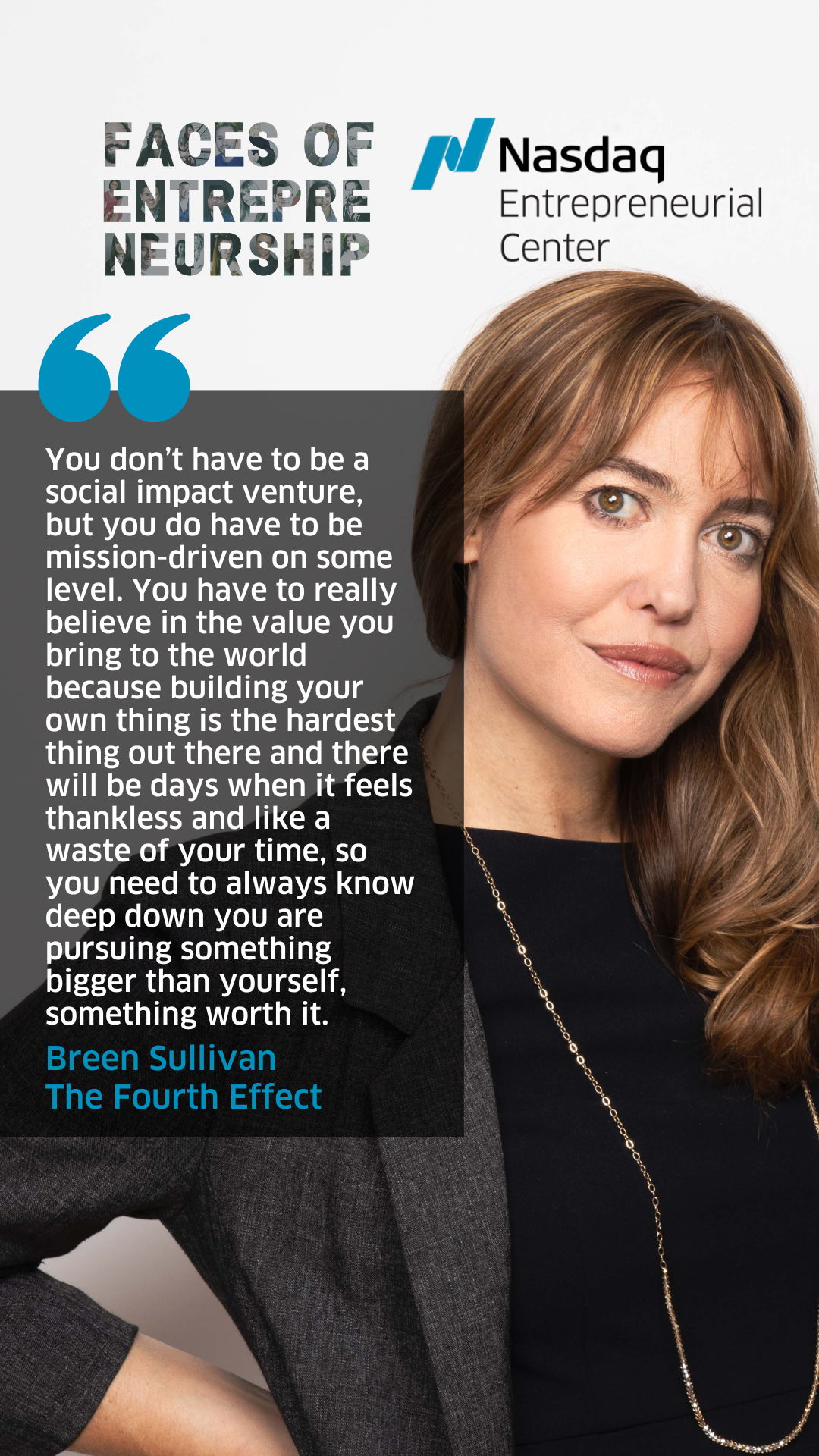 What does “entrepreneurship” mean to you?
What does “entrepreneurship” mean to you?
Breen Sullivan: Spinning straw into gold. The most creative thing you can do. Whatever the industry or the product, you are making an idea reality, and it doesn’t get more creative than that!
Tell us about your first experience with entrepreneurship.
BS: My first truly meaningful experience with entrepreneurship was my first in-house legal job. I found myself a few years out of law school a highly specialized international Trademark lawyer at a large white shoe law firm, miserable, and questioning whether I ever should have become a lawyer in the first place. Immediately after taking the plunge to become a generalist at a small energy efficiency tech startup, I realized being a lawyer could be awesome if it was a way to help a fledgling company scale, if it was a skill set that could be part of running a startup.
Luckily many growth-stage companies realize the value of having a legal function, so it is a skill set you can leverage to be an operator in a high-growth environment. I learned a lot about lawyering but mostly I learned how much I love entrepreneurship, how creative and exciting it is, and how I wanted to work closely with entrepreneurs and be entrepreneurial myself.
What is your company’s origin story? What is the biggest reason you started your business? What did those early days look like and teach you?
BS: As an executive, I realized there was no clear path to board service for women and as a General Counsel to tech startups, I realized startups and growth-stage companies often have unfilled board seats and empty advisory boards precisely because they struggle to find the right people to help them grow and scale their companies. I also noticed male colleagues were sitting on advisory and startup boards and getting promoted! By serving on those boards, they were earning a spot in the board candidate pipeline, and they were tapping into board networks, which sometimes led to angel and venture investing opportunities. But my female colleagues were not doing these things – not because we didn’t want to, but because there was no place to go to access these opportunities.
When I met my co-founder, Kat de Haën, who had experienced firsthand the challenges that many founders face when it comes to networking and fundraising as a serial founder, we knew we needed to build a transparent, first-of-its-kind marketplace that would satisfy the needs of both women seeking for-profit board and investment opportunities, and founders hoping to fund and scale their companies. We knew there was a ‘there there,’ but had no idea how we would go from focus groups in a WeWork to a tech company with a scaleable SaaS product, or what that product would consist of, or how we would incentivize people to use it. It taught me that executing against an idea is entirely iterative, kind of like chipping away at a massive limestone block to unearth the sculpture within. You have to be utterly flexible. And you have to keep chipping away at that block every day no matter how slow the progress!
What do you wish you knew when you started? Is there anything you would do differently?
BS: Have to answer the second question first: YES. Hindsight is 20/20.
Looking back, I would have done a million things differently. That being said, if I had truly understood what I was getting into when I first had the idea, I wonder if I would have had the guts to take the plunge. To me, it feels a bit like having a child – if you really understood how much parenthood would change everything, it might never be the ‘right time.’ The truth is there is no right time to have a kid or found a company, and if you knew what you were getting into at the outset, you might make fewer mistakes but you also might not have the kid or found the company in the first place! So I guess I am saying ignorance can be bliss?
What does “success” look like for you? We’d love to hear your biggest, boldest dream. What do you think will help you achieve it?
BS: Success would be if we became the go-to resource for any woman hoping to advance her board career and for any growth stage company hoping to find the right people to fund and scale their business. Our biggest, boldest dream is that we will influence how women think about advancing a for-profit board career and how a majority of startups and growth-stage companies think about optimizing their boards as they scale. If we could do this, we could change the gender demographics of private company boards in the US from less than 16% women to 50% women and greatly reduce the gender power wealth and funding gap in this country, which would strengthen our economy and benefit us all. Then we would continue to expand and have a similar impact internationally, which would help close the gender power wealth and funding gap worldwide. The Fourth Effect would be a market solution to the systemic inequities creating homogenous and under-performing boards and a lack of funding for under-represented founders in the absence of legislative solutions in the US and in other countries.
What is your superpower as an entrepreneur? What is your proudest and darkest moment so far? Share a key high and a key low from your journey if you can.
BS: My superpower might be that I really like people and see the best in them. Also, I usually think really good things are about to happen. Mix that with some serious FOMO, and you get stick-to-itiveness.
What are your personal driving principles, your top values?
BS: Empathy, trust, and respect when it comes to people and passion for life – you have to care deeply. About something, anything. Otherwise, what is the point?
How have your personal principles and values shaped your company’s values and principles? Give us some examples.
BS: We are deeply passionate about our mission to close the gender power wealth and funding gap. At the end of the day, every single thing we do, every decision we make is about what gets us closer to that goal. As for how we operate and communicate as a team – trusting and respecting each other and doing our best to see the world from the other person’s POV is core to our culture.
What’s it like to work alone or with your partners?
BS: We are very collaborative, so I love when we are all humming along in pursuit of a joint project. I have a lot of meetings during the work day so I try to carve out time on the weekends or early morning/evening when I have time to do the work that requires uninterrupted concentration. It sucks more energy out of me (I’m pure extrovert) but I like that too.
Do you have a mentor? What makes them valuable to you and your business?
BS: For me, it is less about one singular mentor and more about a group of core advisors who have been critical to my success on this entrepreneurial journey.
What role does mentorship play in your world?
BS: I find myself in a mentoring role frequently, especially when I work with interns or more junior team members. I also find myself mentoring entrepreneurs who are not as far along as I am. I also seek out mentorship as a mentee – and find I am better at being a mentee now that I have more mentorship experience.
Many entrepreneurs continue to perfect their daily routines to support their work and greater vision; would you mind sharing your morning routine or a regular ritual that grounds your work each day?
BS: I like to have a steaming cup of coffee, sit down at my desk, and write my ‘to-do list’ for the day. I have a ‘Weekly Triage’ list for the week each Monday and then always refer back to it each morning during the week to make sure I am making progress. I take a lot of haphazard notes during meetings and calls and really benefit from taking 20-30 mins to go through all the scribbles from the day before and create a clear list. It is ok if I can’t get through them all, but I need to know what is at bat, and if it is written down, then I don’t need to worry about it.
What are you reading or have read?
BS: The Cold Start Problem; The XX Edge, Exit Path: How to Win the Startup End Game
Where do you go for inspiration?
BS: My friends, parents, siblings. I love ‘How I Built This.’ I have this very important exercise I do when I am dragging and feeling bad – I stop and go back in time 90 days: What were we up to three months ago? How different did the world look and how far have we come since that day? It never fails to blow me away and reinforce the notion that no matter how behind you feel on any given day, if you keep showing up and keep trying your best, in the aggregate, you can accomplish an incredible amount.
Do you have a favorite quote, mantra, or words of wisdom to get through the tough days?
BS: See above! Also, I really try to tap into the gratitude – to acknowledge how incredibly lucky I am to have the opportunity to work so hard for something I care so much about.
What is a problem that keeps you up at night?
BS: Not being able to move fast enough, not having enough resources/capital.
How do you think about helping others through your work?
BS: Everything we do is mission-driven to get more women on boards and capitalization tables as a way to close the gender power wealth and funding gap, so we are thinking about it all the time. It is why we do what we do.
What advice do you have for fellow (and aspiring) entrepreneurs building and leading teams?
BS: You don’t have to be a social impact venture, but you do have to be mission-driven on some level, you have to really believe in the value you bring to the world because building your own thing is the hardest thing out there and there will be days when it feels thankless and like a waste of your time, so you need to always know deep down you are pursuing something bigger than yourself, something worth it.
Have you raised outside capital so far?
BS: We bootstrapped to date, however I am happy to report we kicked off our first seed round right before the holidays and already have a number of angels from our ‘back room’ investment club on board. Our goal is to raise $1mm from angels and HNW individuals in The Fourth Effect and then raise the second million via an SPV that will allow smaller angel investments from our larger community.
We chose to bootstrap for the first several years because we knew we needed to be free to experiment and test out different business models in order to stay true to our mission and find a truly effective and marketable solution. We also knew the stats when it comes to women founders. It takes women a lot longer, they have to work a lot harder and there is no guarantee they will get funding. That is all time and energy taken away from the business.
We have a very strong investor network given the nature of The Fourth Effect. We have a backroom investment club with over 100 angels and LPs and over 20 venture funds.
[Our network] is entirely the reason we will be able to raise capital! This is why we know the importance and power of cultivating a strong network for founders, and why we encourage them all to join us at The Fourth Effect.
What kind of an entrepreneur do you want to be known as – as in, what do you want your legacy to be?
BS: I want to be known as someone who figured out how to be brave enough to think for herself and challenge assumptions in order to be the change she wanted to see.
Do you have someone you’d like to nominate to be profiled in our Faces of Entrepreneurship series? Please let us know by emailing media@thecenter.nasdaq.org or submitting your nomination using this form.
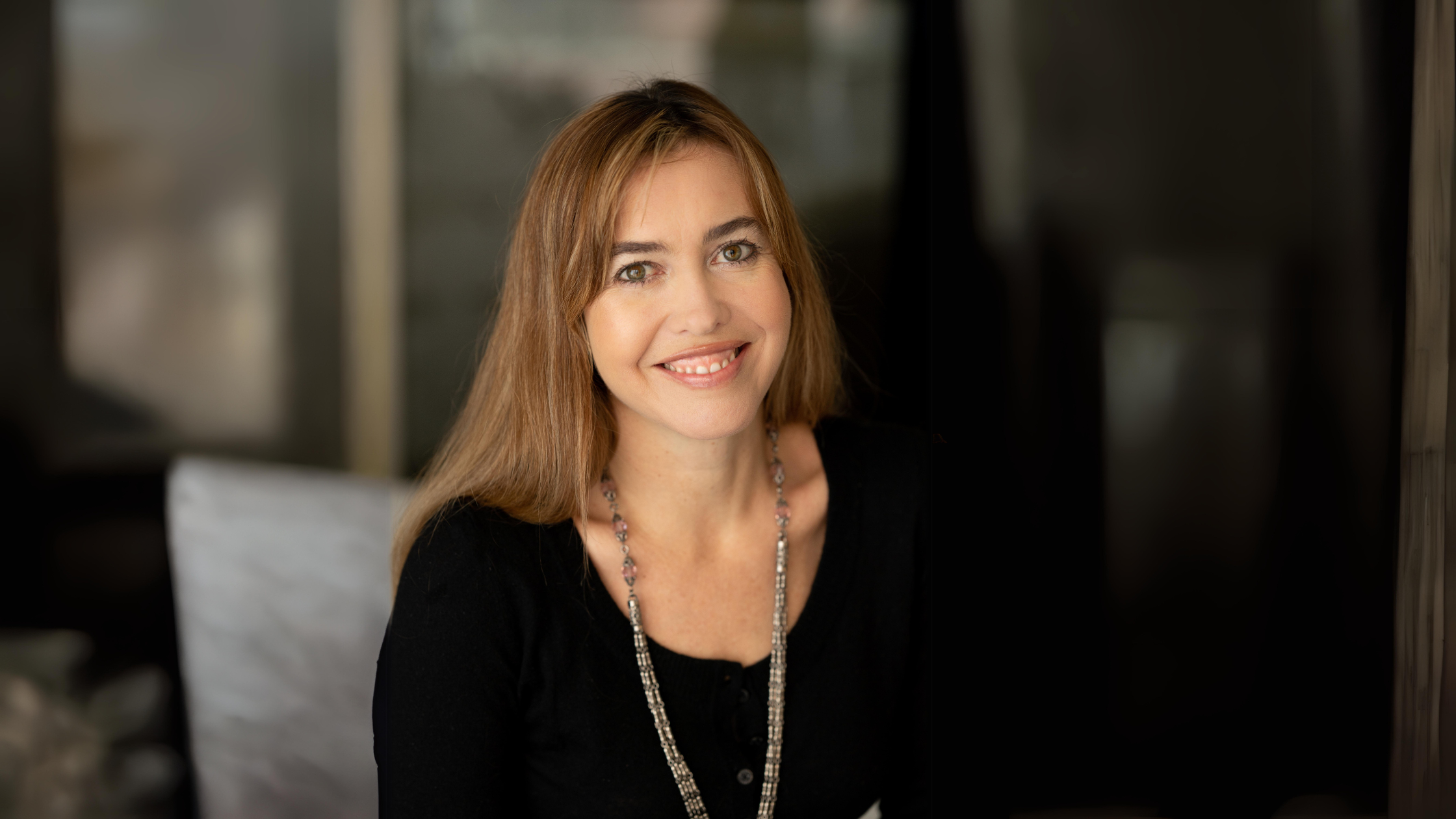
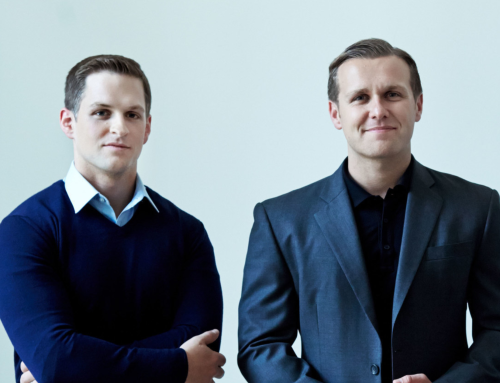
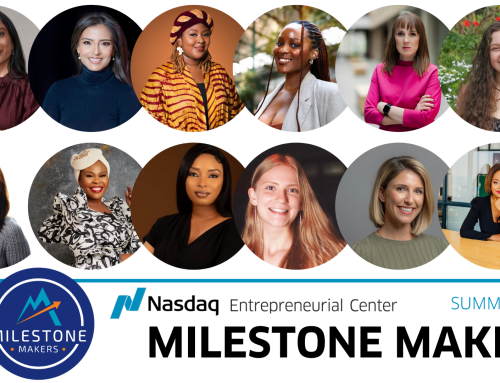
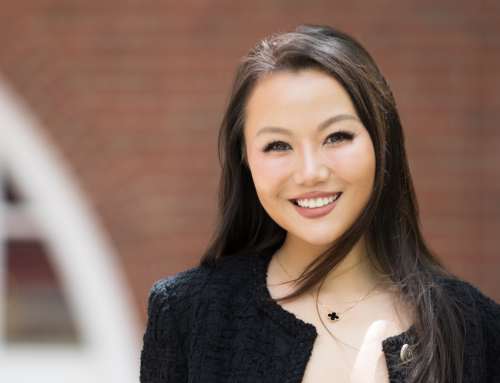
Invite a Friend
Close